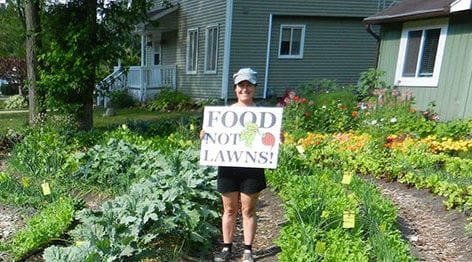The low-residency Bachelor of Arts in Sustainability at Goddard provides students the knowledge, skills, vision and values to help build a sustainable and just planet for present and future generations.
Working closely with faculty advisors, students design a course of study that is individualized and interdisciplinary, practical as well as visionary. Our students understand that the earth and its people face unprecedented environmental and social challenges–as well as unparalleled opportunities to build a sustainable future. We welcome students who are determined to create just lives and livelihoods as partners with the earth and its peoples.
At Goddard, we believe the ecological, environmental and social needs of the world are linked. We see this program as a site for inclusive and collaborative examination of the globe’s most pressing problems. Our understanding is that lasting sustainable solutions involve questions of equity, gender, class and race. In other words, an environmentally sustainable world is comprised of socially just lives and communities.
Given this breadth of focus, we invite students to envision and construct multiple paths—from local to global–towards that future. As students learn about the diverse, changing needs of their communities, urban and rural, they specialize in a variety of focused areas from climate justice to food sovereignty to local currencies to permaculture and more in ways that are innovative, mindful and lasting. Learning opportunities are limited only by student’s creativity and insights.
Sustainability at Goddard provides every student an extraordinary opportunity to undertake vital study and work that serves the needs of the earth and community.
Given our inclusive perspective, we encourage applicants from all communities, professional and academic backgrounds, including the sciences and arts, social science and humanities.
Request more information from an Admissions Counselor.
The Faculty
The Undergraduate Studies Faculty is deeply committed to enacting the College’s mission and educational values in its engagement with students. Faculty members work one-on-one with students as faculty advisors throughout the semester, as well as facilitating group studies, teaching workshops at residency, and acting as second readers to students’ final projects. Our faculty is comprised of national and international scholar practitioners with extensive experience supporting students taking charge of their learning. Faculty members’ work with students is focused, clear, and rigorous.
Admissions Information
The Bachelor of Arts in Sustainability is an undergraduate degree open to any interested students.
New students seeking admission may be admitted at any level up to and including the second semester of the junior year. No more than 75 transferable semester hour transfer credits can be applied to the 120 semester hour credits required for the degree.
A minimum of three semesters of enrollment in the degree track is required for graduation.
See complete application instructions.
Location
Twice a year, at the start of each semester, students attend an intensive eight-day residency at the College’s Plainfield, Vermont campus. Residencies are a rich time of exploration, connection, and planning.
Low-Residency Model
At the start of the semester, students attend an intensive eight-day residency in Vermont, followed by 16 weeks of independent work and self-reflection in close collaboration with a faculty advisor. Goddard pioneered this format nearly a half century ago to meet the needs of adult students with professional, family, and other obligations seeking learning experiences grounded in the real-world.
Residencies are a time to explore, network, learn, witness, and share with peers, staff, and faculty. Students work with advisors and peers in close-knit advising groups to forge individualized study plans that describe their learning objectives for the semester.
Working closely with their faculty advisors, and supported by fellow learners, students identify areas of study, personal goals, relevant resources, and avenues to achieve these goals. Students also attend and are invited to help organize workshops, keynote addresses, celebrations and other events intended to stimulate, inspire, and challenge.
This low-residency model combines the breadth of a collaborative community with the focus of personalized learning, enhanced by insightful exchanges with a faculty advisor.
Degree Requirements
In addition to the general requirements for the BA/BFA at Goddard College, students pursuing the Bachelor of Arts in Sustainability must fulfill the following degree requirements:
- All students pursuing the BA in Sustainability are required to research and write a theoretical essay addressing the question, “What is sustainability?”
- Students also complete foundational studies in the Ecological Dimensions of Sustainability, the Social & Economic Dimensions of Sustainability, Environmental Justice & Ethics, and Creating a Sustainable Life.
- Students engage in experiential learning in order to explore an aspect of sustainability first hand. Examples include learning directly from an expert, participating in community activities, or developing a creative project. Students document experiential learning through a reflective essay that is included in packet work, or as part of their Senior Study.
- Students complete a Senior Study exploring one or a combination of four areas of focus (agriculture, economies, energy or communities). Senior studies frequently launch Goddard students into projects and livelihoods that sustain them after graduation.
Also see the general requirements for the Bachelor of Arts degree.
Work of the Semester
During the semester, students send faculty advisors “packets” of work that vary in content but typically contain diverse forms of learning, including study journals, annotations, research papers, creative writing, samples of artwork, autobiographical and process reflections, and audio/video production.
A detailed response from the advisor is both supportive and challenging, engaging in the learning the student presents and suggesting resources and strategies for the next packet. The advisor also addresses the packet in the context of the student’s semester goals and their progress toward fulfilling degree requirements. Over the semester, the exchanges between student and advisor create a dialogue that is exceptionally in-depth and meaningful. Students often describe these exchanges as transformative and empowering. At the end of the semester, students and advisors write comprehensive evaluations of the student’s learning.
